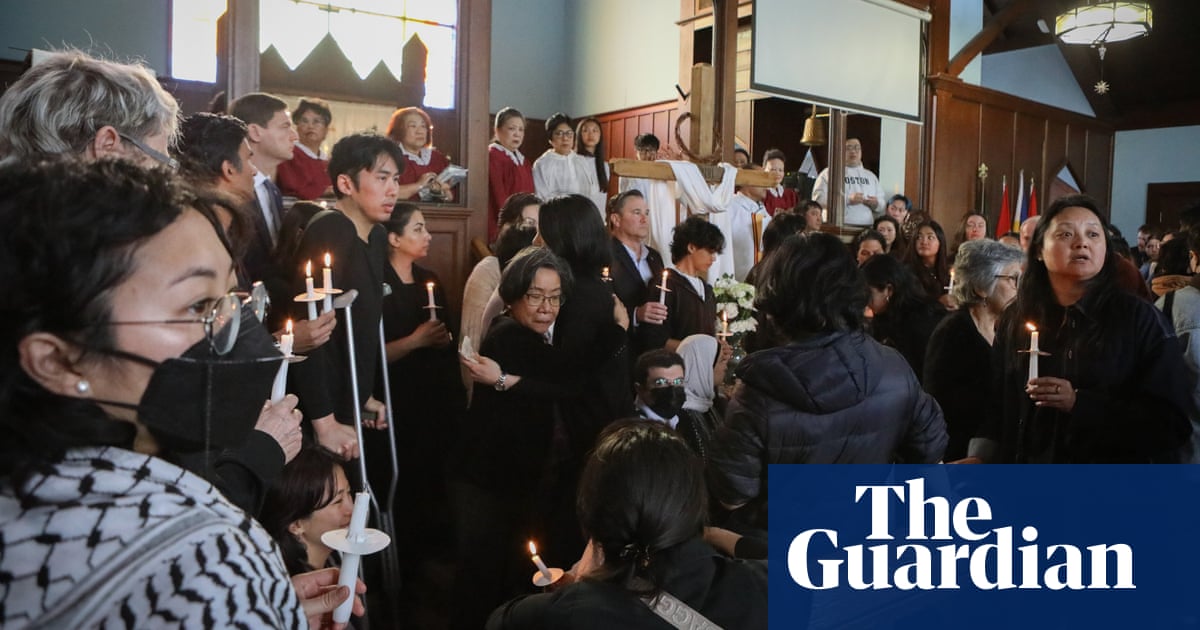The vigil on Sunday evening drew a crowd so large that police in Vancouver had to move the crime scene barriers back so that people would not spill out on to the busy traffic along 41st Avenue.
“It’s amazing. It’s really a show of how important the Filipino community is just very broadly,” says Chelsea Brager.
Brager works with a Filipino youth organization called Anakbayan BC that helped organise a candlelight vigil on Sunday evening to remember victims of Saturday’scar-ramming attackthat killed 11 people and injured dozens at a Filipino heritage festival in the Canadian city.
Earlier in the day, the nearby Anglican memorial church of St Mary the Virgin was overflowing with members of the Filipino community and others who wished to pay their respects.
Saturday had been intended as a night of celebration for the community – of resilience and of collective resistance.Lapu Lapu Daycommemorates the victory in 1521 by Indigenous Filipinos, led by Lapu Lapu, against Spanish colonisers on the island of Mactan.
Members of the Black Eyed Peas had just finished their headlining set in Vancouver’s Sunset neighbourhood, home to the city’s Filipino community, when a driver tore through the crowd.
“Last night, there was a horrible tragedy that occurred at a happy event, and we’re still reeling from it,” said RJ Aquino, the chair of Filipino BC, the organisation behind Saturday’s event, at a press conference. It’s “not lost on us and the people in our team that the spirit of the festival was about resistance, resilience”, as well as courage and strength, “and we’re going to have to call that up in ourselves”, Aquino added.
Brager first knew something was wrong when they, on their way home, noticed others running away from the event. “We didn’t quite know what was happening until we saw the news when we got home,” said Brager.
“I just saw my phone kind of blow up with tons of messages,” said Maki Cairns, with Gabriela BC, a Filipino women’s movement which also helped organise the Sunday evening vigil.
Some were messaging to see if Cairns could contact loved ones they’d had trouble reaching, while others were asking if she was OK. “I remember getting people from the US messaging me as well to make sure I was OK,” Cairns said.
Cairns’ own first call was to her mother, who she was relieved to hear had not been at the event.
In Vancouver, Filipinos have deep roots and a strong sense of community, something Aquino invoked on Sunday.
“Looking at the history of our people, we’ve encountered many tragedies, and we’re going to be OK. It’s OK to not feel OK right now. It’s OK to be sad, be angry, be confused. But as we work through those feelings, we will have each other to do that,” he said.
“We’ll need to make sure to be there for each other to do that. There’s no better time to really live up to the bayanihan spirit and say that we are here to lift each other up.”
“Bayanihan” refers to a community spirit in Filipino culture, and the need to lean into bayanihan was echoed by several others on Sunday.
Brager said it applied both to the origins of Lapu Lapu Day – the collective resistance that led to the victory against the Spanish – and to the response to Saturday night’s tragedy.
Back at the church of St Mary the Virgin, attendees heard a sermon by Father Expedito Farinas, who related the biblical story of the Apostle Thomas, whom he described as being in so much despair after the crucifixion that his faith in Jesus’s resurrection was shaken. They sang hymns, took communion and shared lunch in a parish hall. Inside and outside the church, community members were seen hugging and comforting one another – sharing tears and at times laughter.
Jaela Villegas, from Migrante BC, a Filipino organization fighting for migrant worker rights in British Columbia, said the attendance at the sermon was “overwhelming in a really good way”.
“I didn’t just see my Filipino community. It was also other communities or nationalities, or even other religions. They came to support us, and so that’s very comforting,” Villegas said.
“A Palestinian earlier came up to me and said, ‘Your loss is our loss’. I think that’s so heartwarming.”
